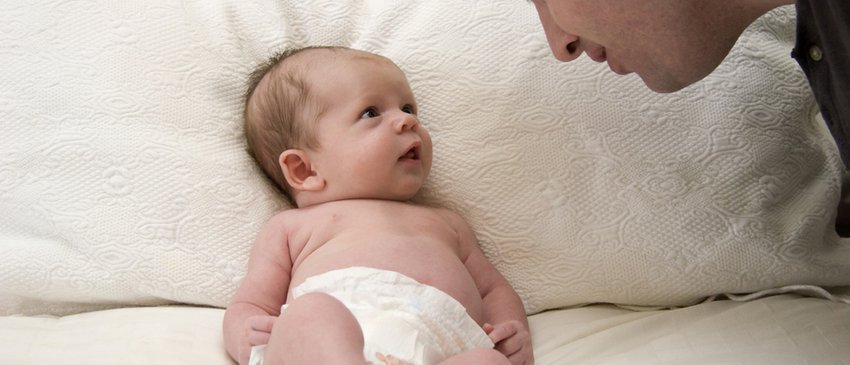Talk To Your Baby: Early Years Conference

About our Talk To Your Baby conference
Talk To Your Baby is our annual conference with a focus on language acquisition in the first 1001 days, and a key strand of our early years activity. The conference is a cross-sector summit of thought leadership and best practice, with speakers from academia, policy and public health. The aim of the conference is to advance the discussion around how to improve children's reading, writing and speaking skills and enhance the life chances of future generations.
The Talk To Your Baby 2024: Communication, connection and collaboration conference took place on 12 March 2024 in London. Ensure you are signed up to our newsletter to be informed about our plans for next year.
Tips to support communication development
Babies and toddlers communicate long before they start to talk, through smiles, gestures, showing and giving objects, pointing and vocalising. Parents may need support to recognise their baby as a communicator and understand their role in making the most of opportunities for communication exchanges during their day. We've put together five top tips to support babies' communication development that can be shared with parents and carers. Below, we share each tip with some key messages for parents plus recent research that underpins this methodology.
Tip 1: Be face to face with your child
Messaging for parents and carers: This helps you and your child look at and listen to each other, helping you to see what your child has to tell you.
Further reading: A recent review of evidence demonstrates the importance of face-to-face play for infants and discusses the implications for practice.
Tip 2: Watch and wait – let your child lead and then join in
Messaging for parents and carers: Your child will feel good when you show you’re interested in what they do, and enjoying the activity will help them to concentrate.
Further reading: Following the child's lead facilitates joint attention (where adult and child share a common focus) Research from 2018 indicates that joint attention (and infant gesture use) predicts later language ability.
Tip 3: Wait – give your child time to respond
Messaging for parents and carers: This encourages your child to communicate however they can – smiling, making a sound, pointing or even saying words – which teaches them that it’s their turn in the conversation.
Further reading: Recent research shows that frequent pauses in vocal interactions by parents are significantly correlated with more active vocal participation from infants.
Tip 4: Talk about what your child does
Messaging for parents and carers: This helps keep your child interested in what they are doing and teaches them useful words to describe what they like to do.
Further reading: Research from the Nuffield Foundation shows that infants whose parents frequently use contingent talk go on to have larger vocabularies.
Tip 5: Watch how your child tells you things and put the words in
Messaging for parents and carers: This teaches your child the words for things they want to ask for or say, and also encourages them to try again if they know that you are listening.
Further reading: Parental input that expands a child’s attempt at language is an important contribution to vocabulary growth. Read more in this research.
Sharing these tips with families
You can download a free poster of these tips. Or visit Words for Life, our family-facing site, where these talking tips are explained for parents and carers.
Resources for families
Words for Life is our comprehensive online zone for parents seeking ideas and guidance for activities that will engage their children at home, whilst also benefiting their reading, writing and language development.

If adults talk with children effectively—taking the lead from the child, elaborating on what they say, asking questions, sharing rhymes or songs or books— then children are given the best start in developing the cognitive tools they need to succeed at school.
Early Intervention Foundation, The Best Start at Home, 2015
Early Years support at the National Literacy Trust
The National Literacy Trust has a long history of working in the early years sector, directly changing childrens' lives through literacy. Below is a small selection of our work. Remember you can always contact us to find out more.
Early Words Together
Our flexible and evidence based Early Words Together programme is designed to improve literacy skills with families in a nursery setting. Proven to improve children's language development and parental engagement, this programme has been stringently evaluated and implemented across the country.
We have also developed Early Words Together at 2, Early Words Together at 3 and Early Words Together for Multilingual Families. The best way to find out more is to get in touch with the team.
Better Health Start for Life
Better Health Start for Life forms part of our home learning environment initiative, run with the Department for Education (DfE) and the Department for Health and Social Care. The project aims to address need within the most disadvantaged communities in England. Children from these communities start primary school with a vocabulary 19 months behind their peers, a gap most will never recover from.
Better Health Start for Life works to combat this issue through local events where volunteers model chat, play and read activities from our Words for Life website for parents and families. Here, families can also sign up for our Words for Life newsletter which suggests a new activity each month to try out, as well as providing a further nudge towards doing these activities more often as part of their day-to-day routine.
HELLO improvement framework
The HELLO self-report and improvement framework can be used by practitioners and settings to review their own practices and implement positive changes to their communication, language and literacy provision. The framework focuses on three key areas, partnerships with parents, skilled practitioners and enabling environments.
For more information, read the final report from HELLO in Manchester.
Multilingual resources
Our series of bilingual quick tips, in 19 different languages, is helpful for parents and early years practitioners to help children develop good talking and listening skills.
If the language you need isn’t listed, we have created a blank template for each topic so that you can adapt it to the desired language.
We've also developed the Time Together booklet, translated in to a wide range of languages, for practitioners to share with multilingual families in their setting or community. The booklet provides a colourful and easy-to-read guide that is full of suggestions for how parents can support their young child's learning at home.
Early Words Matter campaign
Early Words Matter is our pioneering, five-year campaign to support 250,000 children across the UK. It will include flagship programmes and local community outreach in areas worst hit by poverty and the cost-of-living crisis.